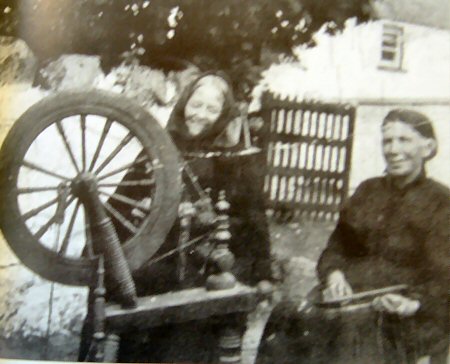The art of linen cloth production was brought to the north of Ireland by settlers in the seventeenth and eighteenth centuries. Prior to that the main thread spun and used in garment-making was wool.
It was fortunate that Ulster specialised in linen for the British Government that ruthlessly suppressed competition to English manufacture through tax and excise duties, had no reason to penalise the Irish linen industry. Through the eighteenth and into the nineteenth centuries it was a ‘cottage’ industry here, although the First Industrial Revolution in Britain dates to this time.
That linen production was widespread and rewarding at the close of the eighteenth century is evident from the lists of flax-growers drawn up in 1796. Almost one hundred such growers are listed for the Lordship of Newry, indicative of a thriving agricultural product but also of a successful industry. Although the list is of bare names (with the first thirty named having more than one ‘wheel’) it is the earliest list available of family names in the Newry area. As such it is highly significant. The family researcher should however bear a few points in mind. Flax being an agricultural plant they were more likely to have been rural (than urban) dwellers and the Lordship of Newry had extensive lands in S Down, S Armagh and Louth. No addresses are included or any further information. That this was a rewarding crop indicates that the poorest, for example cottiers, are not included. Also the penal laws continued in force, preventing extensive Catholic land ownership. There was also considerable discrimination against Dissenters (mainly Presbyterians): a section of them was active in the United Irishmen movement in Newry. The genealogist cannot conclude anything from the information here alone but may find enough to warrant further research.
By way of example only, your author had a great great great grandfather named James McKeown who lived in the early nineteenth century on a farm in The Fews district of South Armagh. It is known that a farmer descendent of his a century later in the same region was growing flax. There is a James McKeown recorded her in 40th place. It may or may not be the same man, or his father. It is however a significant find and fully justifies further research. Another conclusion that can be drawn is that the modern English spelling of many of our common surnames was in force although Irish was still the language of most people. The reader may wish to check whether any of his/her name farmed here then, or to draw up a list of the most common surnames from these hundred. There are certainly many of the most frequently heard surnames of today, Boyle, Mooney, Clark, Fegan, McIlroy, Wilson, McCracken etc. I have reproduced names as they appear in the list.
Have fun!
Lordship of Newry Flax-Growers Lists 1796
Samuel Gordon James Connor John Thompson James Burns Richard Waddel Alexander Riggs James Wilson Robert Wilson James Stitt Brice McMullan James Stewart John Crozier Hugh Magrath Samuel Reid Cornelius McCullough David Pollock J ohn McMullan John McCullough Sarah Mills John Mills Andrew Murdogh John Graham William Crawford Thomas Crawford Hugh Crawford Andrew Clark William Heslip John Grant David Anderson William Andrews Robert Kerr T homas Treanor Patrick Treanor Rose Mathews Bernard Magiverigen Patrick McCamely John Morgan James Ferran Edward Carry James McKeown Patrick McAvoy Edward Bagenal Patrick Bagenal Alexander Boyd Adam Fegan Henry Moony Adam Kernaghan William Martin Susannah McCleland John McMinn John McCracken Isaac Leister Agnes Henry Jane Wilson John Lutton Richard McIlroy Charles Quin Patrick Boyle William Bradford Laurence Murphy Michael Turley James Morgan Hugh Morgan Hugh Waddell Patrick Lavery Andrew Dodds Patrick McIllorey Robert Irwin Elizabeth Maffot John Mathews John Campbell Patrick Fitzpatrick James McCullough John Scott Robert Harbison Phelemy Keating Thomas Graham William Crawford James Sloane John Bailie George Cantley David Campbell Andrew Mechefemy William McComb Thomas Magiverigen William McKee William Boyd William Dunn Andrew McCullough David Johnson John Penny Anne McIlroy Margaret Sprott Robert Logan
.. Oliver Plunkett …
